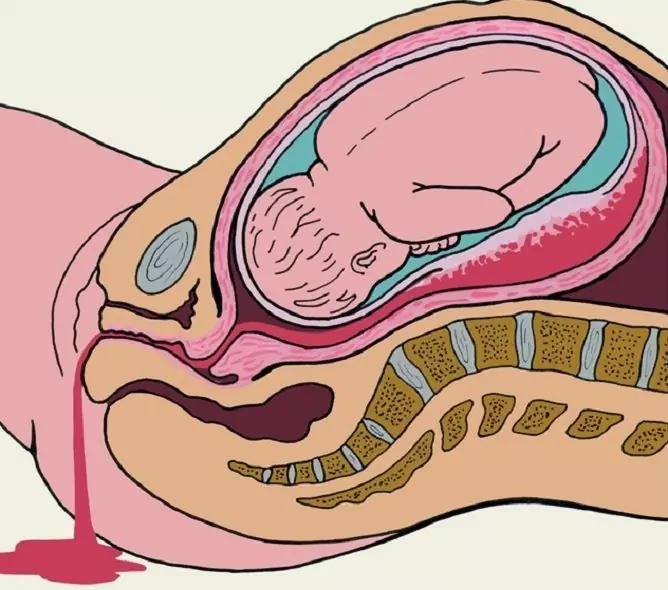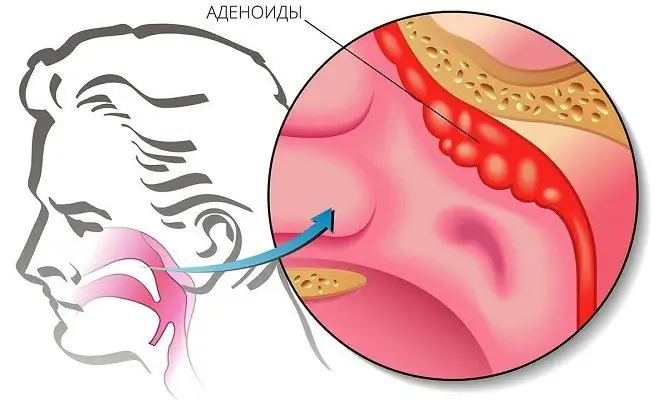- Author Rachel Wainwright [email protected].
- Public 2023-12-15 07:39.
- Last modified 2025-11-02 20:14.
Trichomonas colpitis
The content of the article:
- Causes and risk factors
- Kinds
- Symptoms of Trichomonas colpitis
- Diagnostics
- Treatment of Trichomonas colpitis
- Potential consequences and complications
- Forecast
- Prevention
Trichomonas colpitis (vaginitis) is an inflammation of the vagina, the causative agent of which is Trichomonas - the simplest microorganism belonging to the flagellate class.

The disease more often affects women of reproductive age who are sexually active. Trichomonas infection in pregnant women can lead to infection during childbirth, which occurs in about 5% of cases. However, in view of the structural features of the vaginal epithelium in newborn girls, Trichomonas colpitis in them proceeds in an erased form and is prone to self-healing.
Simultaneously with Trichomonas colpitis (in men - urethritis), other sexually transmitted diseases (genital herpes, candidiasis, ureaplasmosis, chlamydia, gonorrhea) are often diagnosed. Currently, experts have suggested that Trichomonas infection increases the risk of allergic and oncological diseases, mastopathy, and diabetes mellitus.
Causes and risk factors
The causative agents of Trichomonas colpitis are Trichomonas, belonging to the type of protozoa, the class of flagellates. They are anaerobic unicellular organisms and are widespread in nature. Thanks to the flagella, Trichomonas have good mobility. Optimal conditions for their reproduction are 35-37 ° С and the absence of oxygen.
Once on the mucous membrane of the vagina, Trichomonas begin to actively develop and multiply, becoming the cause of the inflammatory process. In the process of vital activity, they produce a special enzyme - hyaluronidase, with the help of which they penetrate into the intercellular space, lymphatic tracts and bloodstream, spreading throughout the body.
One of the important features of Trichomonas is their ability to change shape and disguise themselves well as blood cells - lymphocytes and platelets. This allows them to avoid being attacked by the immune system.
A number of other pathogenic microorganisms (cytomegalovirus, herpes virus, fungi of the genus Candida, chlamydia, ureaplasma, gonococcus) can penetrate inside Trichomonas. As a result, they acquire protection from immune cells and drugs.
Trichomonas colpitis in women refers to sexually transmitted diseases, as it is sexually transmitted. In very rare cases, there is a contact-household path of infection (through towels, underwear, hygiene items).
Since Trichomonas in the process of life violate the integrity of the vaginal epithelium, the risk of infection of women with other sexually transmitted infections, in particular HIV, increases.
Risk factors are:
- hormonal imbalance;
- hypovitaminosis and other immunodeficiency states;
- promiscuous sex life;
- ignoring barrier methods of contraception;
- unfavorable socio-economic factors;
- alcohol abuse, drug addiction.
Kinds
Depending on the duration and severity of symptoms, acute, subacute and chronic Trichomonas colpitis are distinguished. Trichomoniasis is distinguished as a separate form - asymptomatic persistence of Trichomonas in the body.
Symptoms of Trichomonas colpitis
The incubation period for Trichomonas colpitis lasts from two days to two months. A long incubation period is usually observed in the erased form of the disease.
The main symptoms of Trichomonas colpitis are:
- vaginal discharge, green or yellow, with an unpleasant odor;
- irritation of the mucous membrane of the genitals, which is accompanied by a burning sensation and itching;
- dermatitis of the inner thighs;
- dysuria;
- the appearance of ulcers or erosions on the mucous membrane of the genitals;
- recurring pain in the lower abdomen;
- dyspareunia - painful sensations that occur at the time of coitus or immediately after it.
Symptoms of Trichomonas colpitis intensify a few days before the onset of menstruation.
The volume and nature of vaginal discharge depends on the stage of the disease. In acute inflammation, they are abundant, and with chronicity of the pathological process, they become scarce, periodically completely stop.
The fresh form of Trichomonas colpitis, in the absence of timely treatment, becomes chronic, which, in turn, gradually then forms a long-term Trichomonas colpitis.
Chronic trichomaniac colpitis is almost asymptomatic. Only a very small number of patients (less than 5-8%) have sexual dysuria and dysuria.
With Trichomonas, there are no clinical signs of vaginal inflammation, the pathogen is detected only during laboratory diagnostics.
Diagnostics
It is possible to assume that a woman has Trichomonas colpitis on the basis of the symptoms of the disease and the data of a gynecological examination. When viewed in the mirrors, hyperemia and swelling of the vaginal mucosa, focal hemorrhages on the cervix are noted. Colposcopy reveals dysplasia of the epithelium, in some cases - the appearance of atypical cells.
However, the preliminary diagnosis must be confirmed by the results of laboratory tests:
- microscopy of a smear from the vagina, urethra and cervix - allows you to detect Trichomonas in 50-60% of cases;
- microbiological (cultural) method - sowing the vaginal discharge on an artificial nutrient medium - the most accurate method for diagnosing Trichomonas colpitis, which allows to identify the pathogen in 99% of cases;
- immunological methods (PCR diagnostics) - are used to detect or exclude a viral infection.
Differential diagnosis is carried out with gonorrhea, bacterial and candidal vulvovaginitis.
Treatment of Trichomonas colpitis
Treatment of Trichomonas colpitis is carried out by venereologists and gynecologists. For it to be effective, the patient's sexual partner should also be treated (even if the test for trichomoniasis showed a negative result). Before the end of the course of therapy, sexual intercourse should be excluded.
Since Trichomonas are capable of absorbing smaller microorganisms, including pathogens of a number of sexually transmitted diseases, the treatment of Trichomonas colpitis should be combined with active therapy for identified sexually transmitted infections.
In pregnant women, treatment of Trichomonas colpitis is possible only in the II-III trimesters, its need is determined by the doctor supervising the pregnancy.
Trichomonas are resistant to antibiotics, therefore, drug treatment of the infection is carried out with antiparasitic agents belonging to the group of 5-nitroimidazoles (Metronidazole, Tinidazole, Nimorazole, Ornidazole, Ternidazole). When using them, the use of alcoholic beverages is strictly prohibited. This is due to the fact that with a combination of 5-nitroimidazoles (with the exception of Ornidazole) and even small doses of alcohol, an antabuse-like reaction develops due to the effect of these drugs on the alcohol metabolism in the body.

Source: lubeznaya.ru
In the acute and subacute form of Trichomonas colpitis, in the absence of complications, treatment is carried out only with antiprotozoal agents. In case of a chronic or complicated course of infection, stimulating therapy is also indicated.
Systemic treatment of Trichomonas colpitis can be supplemented with local application of vaginal suppositories, creams, gels with antiprotozoal and anti-inflammatory effects.
The criterion for the cure of Trichomonas colpitis is the complete absence of clinical signs of the disease in combination with negative results of laboratory diagnostics.
Potential consequences and complications
Trichomonas colpitis is an insidious disease that, in the absence of treatment, can lead to the development of long-term consequences and complications. These include:
- high risk of contracting sexually transmitted infections, including HIV;
- chronic diseases of the genitourinary system;
- pathology of pregnancy;
- infertility;
- cervical cancer.
Forecast
The prognosis, provided that treatment is started early, is favorable. It worsens when trying to self-medicate Trichomonas infection, as Trichomonas acquire resistance to the action of antiprotozoal drugs, begin to multiply more actively and more aggressively affect the tissues of the body. As a result, the disease acquires an atypical course, becomes resistant to standard therapy, and is accompanied by the development of complications.
Prevention
For the prevention of Trichomonas colpitis, it is necessary for casual sexual intercourse to use barrier methods of contraception, that is, condoms, and it is best to abandon such relationships altogether.
YouTube video related to the article:

Elena Minkina Doctor anesthesiologist-resuscitator About the author
Education: graduated from the Tashkent State Medical Institute, specializing in general medicine in 1991. Repeatedly passed refresher courses.
Work experience: anesthesiologist-resuscitator of the city maternity complex, resuscitator of the hemodialysis department.
The information is generalized and provided for informational purposes only. At the first sign of illness, see your doctor. Self-medication is hazardous to health!






